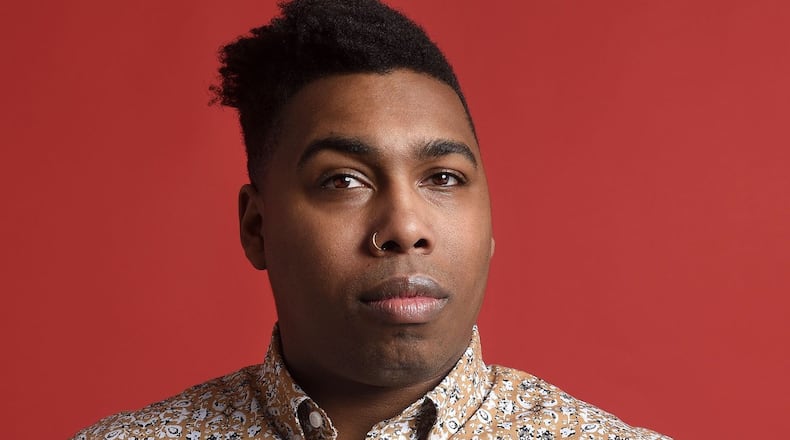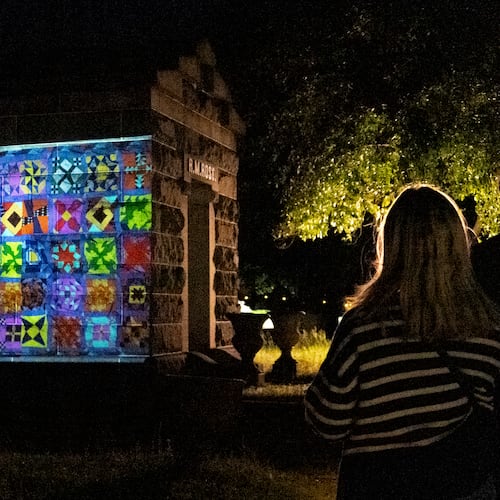On the eve of Mother’s Day 2011, Saeed Jones’ mother, Carol Jean Sweet Jones, died. “Mercy,” a poem that appears in his debut poetry collection, “Prelude to Bruise,” relays the depths of his grief and the kind of longing one experiences after the loss of a loved one.
Jones' follow up is a radiant debut memoir, "How We Fight for Our Lives." It exudes the same sensibility and lyricism as "Prelude" and offers an extended tribute to Jones' fierce and devout Buddhist mother.
Jones and his mother shared a special, indelible bond born of the tiny size of their nuclear family — he was an only child; she was a single mother — and their appreciation of good literature. His account of their relationship is tender and whimsical. “My mom likes to say, ‘We don’t eat coconut cake in this family,’ as if we were the kind of family that created traditions and stuck to them. We weren’t. No family reunions; no silly nicknames with winding back stories; no annual family vacations. We did, at least, have a family story about coconut cake.”
Jones' mother is an enigma the same way all mothers are to children — part magic, part goddess, part intrigue. In a poem titled "Elegy with Grown Folks' Music" in the book's prelude, Jones catches a glimpse of his mother in her element, dancing in the kitchen to Prince's "I Wanna Be Your Lover." Witnessing her impromptu, devil-may-care choreography fills him with both awe and confusion. "What is this nasty song and where did she learn to dance like that and why…"
“How We Fight” is also a story about Jones’ adolescence in the thick, heavy heat of Lewisville, Texas, a wealthy northern Dallas suburb he and his mother moved to because of its good public schools. Jones is an engaging narrator, a lover of language, and his use of imagery to relay his coming of age as a gay black teen in the Deep South is cinematic. “There were fields guarded by sunflowers so tall their petals tapped my forehead whenever I stood in front of them. Blue-bonnets, the state flower, dotted the meadows farther away from the road, along with Indian paintbrushes, which looked like the stray feathers of some mythic bloodied bird.”
Silence is a powerful medium in “How We Fight,” and it’s loudest when Jones wrestles with how to tell his mother he’s gay, a fact about himself he’s known since a very young age. “She had to know already. Even with our gift for stalwart denial, there was just too much evidence for her to ignore the fact that her son was clearly attracted to other men. Coming out to her, then, became such a daunting prospect because I knew I would have to lie in order to tell the truth.”
In his youth, Jones hears the word “gay” even when it isn’t spoken — while watching two brothers from his apartment complex toss a ball, in the glossy porn magazines he closely studies and during a trip to New York City, where he and his mother spot two men holding hands and a drag queen during Pride. “I’d read in one of my nature books that there are some sounds which occur at a frequency only dogs and special radios can pick up on. Sounds that can only be heard if you were designed to hear them. I could hear that word ringing high above every conversation, every moment, because I thought about being gay all the time.”
Jones’ quest to learn more about his sexuality takes him to the local public library a few years after the emergence of the AIDS cocktail, an effective treatment that shifted the prognosis of the disease from a near certain death sentence to that of a serious chronic illness. But when Jones pulls books from the shelves, they confirm his hypothesis that AIDS is lethal, that gay people get AIDS, and when they do, they die alone. He worries this same fate may await him. “When I stood up to put the books back on the shelf, I realized my hands were shaking. I felt like I had made the mistake of asking a fortune-teller to look into my future, and now I was being punished for trying to look too far ahead.”
Poets are no strangers to penning memoir. Their mastery of the economy of language affords them the ability to unspool sweeping narratives in sparse prose. Some recent memoirs by poets that sublimely achieve this jump to mind — Tracy K. Smith’s “Ordinary Life”; Camille Dungy’s “Guidebook to Relative Strangers: Journeys into Race, Motherhood and History”; and the late Nina Riggs’ “The Bright Hour,” about Riggs’ final months of life with metastatic cancer.
Jones joins this elite group with a slim 208-page volume where every passage packs a punch. His chapters are potent musings on everything from the evangelical (and punishing) Christianity his grandmother practices in Memphis, to his first encounter with a gay slur, to the brutal 1998 killings of Matthew Shepard in Laramie, Wyoming, for being gay, and of James Byrd Jr., a black man who three white supremacists chained to the back of a pick-up truck and dragged to his death. The cruel ends they endured haunt Jones. “Just as some cultures have a hundred words for ‘snow,’” he writes, “there should be a hundred words in our language for all of the ways a black boy can lie awake at night.”
Certainly, “How We Fight for Our Lives,” is a meditation on what keeps Jones up at night. But it is also a stunning book that will keep readers up at night, their eyes glued to every page.
NONFICTION
By Saeed Jones
Simon & Schuster
208 pages, $26
About the Author
Keep Reading
The Latest
Featured


